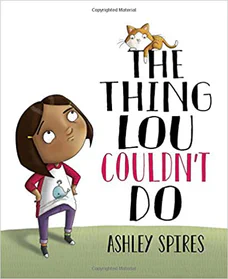The Thing Lou Couldn’t Do

Recommended Age Range: Preschool through 2nd grade.
Publisher's Summary:
Lou has never climbed a tree before, and she’s sure she can’t do it. So she tries to convince her friends to play a not-up-a-tree game. When that doesn’t work, she comes up with reasons for not joining them — her arm is sore, her cat needs a walk, you shouldn’t climb so soon after eating. Finally, she tells herself she doesn’t want to climb the tree. But is that true, or is this brave adventurer just too afraid to try?…Ultimately, Lou faces her fear, and although she fails, the effort empowers her, encouraging a growth mindset. All the while, Lou’s friends model compassionate friendship by offering to teach her how to climb and then moving the game.

Dr. Annie's Takeaways
Recommended for: Many children will enjoy this book simply because it’s a good book. It’s a particularly great read for a child who avoids tasks they’re afraid they won’t succeed at. It’s a story that normalizes and neutralizes failure and celebrates giving something a try.
Would a child like it? Definitely. It’s funny and fun, and it takes the threat out of the experience of failure.
Evidence-Based Practices:
Exposure
Tone: Funny, silly, encouraging
Story Quality: This story is funny–on a kid level and on an adult level. It’s full of fun, clever details, and it has a ton of heart. Lou is afraid to climb the tree because she doesn’t think she can do it. When she ultimately decides to give it a try, she isn’t, in fact, able to do it, “not yet anyway.” I love this. So often, books on this topic show kids trying something and maybe failing once but pretty immediately being successful, which actually undermines the message that it’s okay to make mistakes and fail! Lou isn’t able to climb the tree, but her friends are supportive, and they move on from the tree to the play structure so that Lou can join in. Nothing bad happens, and Lou is empowered to try again soon, “maybe even tomorrow.”
Illustrations: Really charming, emotionally expressive drawings in vivid colors.
Representation: Lou is a girl with light brown skin and straight, dark brown hair. Her friends include a White boy, a Black girl, and a girl with light brown skin and straight black hair. Lou has a mom who also has light brown skin and straight, dark brown hair. Lou and her mother live in a house with a backyard.
Psychological Practices: This book lovingly portrays different strategies kids use to avoid a task they’re anxious about (in this case, Lou is anxious that she won’t be able to climb the tree). Children reading the book could guess what Lou is feeling and why she needs to change her shoes, walk the cat, wait after eating, etc. before she can try to climb the tree. In the end, Lou works up the courage to try, and although she works hard at it, she isn’t able to do it. Instead of this being a disaster, Lou’s friend helps her up, and the children run off to a play structure together. I love the message that trying and failing aren’t okay simply because they’re the steps to success. They’re also okay in and of themselves! Literally nothing bad happened when she tried and failed, and she might have even felt a bit proud of herself for trying.
Concerns: There are two pictures of the children playing pretend (alongside pictures of the children building “mighty fortresses” and running “faster than airplanes”) in which they are dressed in British colonial outfits–pith hat, khakis–while they are “rescu[ing] wild animals.” I certainly think the intention was harmless, but these images could be hurtful to many people. In general, I think we should be moving away from using the image of British colonialists as shorthand for fun animal explorers due to the harm colonialism perpetrated.
